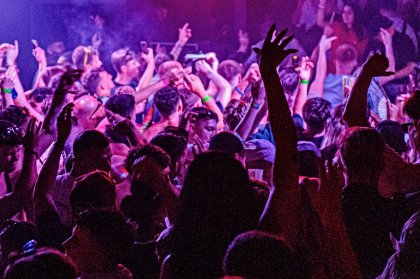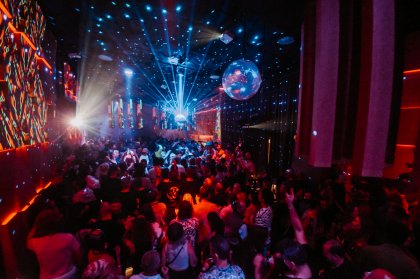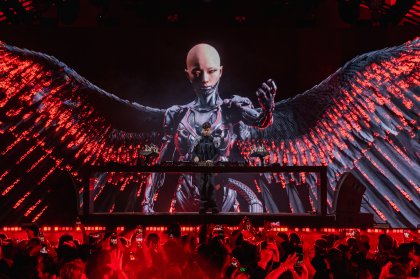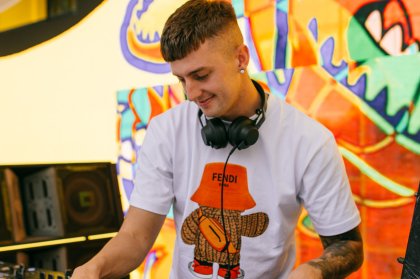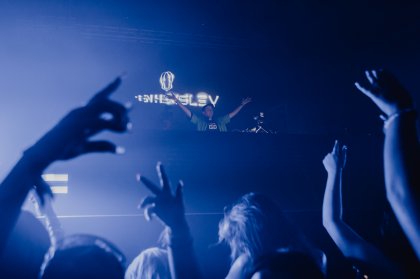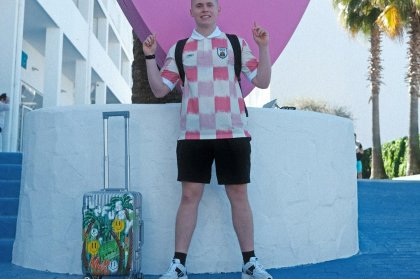
For someone who was never a DJ, Joseph Keevill knows a thing or two about coherently melding electronic music inside loud, dark rooms. Just listen to the live production podcast he recorded for us whilst testing out the soundsystem inside a London nightclub.
“One of the UK's freshest and exciting acts… Amazing,” said Carl Cox of the man in question, who's more widely known under his moniker Saytek. The techno kingpin doesn't point his followers in the direction of something for nothing, and a big part of the reason for this particular recommendation is the artist's deft ability to deliver largely improvised performances.
As such its no surprise that, with a decade-spanning portfolio, Keevill is the anti-thesis to the legions of by numbers, bandwagon producers. His popularity is only on the rise, and stems from a reputation acquired through hard work and, of course, timeless music.
Cubism, the label he runs with Mark Gwinnett, is also going from strength to strength right now. An appropriate moment to extend this talented individual our warmest editorial welcome then, we gave him a call to talk about why he does what he does, bad soundsystems, and whether or not there's less spontaneity in club music these days.
Hi Joseph, hope you're well today. Thanks for the podcast, for those yet to download it, what should people expect?
"The podcast is basically me performing live at Cargo in London from a couple of weeks ago at our Cubism Records night, so this is the sound of me on stage in front of a crowd going crazy.”
Sounds like things went off. We enjoyed last year's ‘Reworked' album too. Is there anything you'd change about it now?
“It was a great release, made up of a lot of original material, and a few bits and bobs that had already been released. The concept was to take elements of my live show which were reworked by myself, and lots of remixers, and I thought that was a great idea."
“Whether it stood up as an album to listen to at home is a different story altogether though, but that was never the intention. This was more for DJs really. My previous albums had been as much at home on an iPod as in a club, whereas this wasn't. So in retrospect I would have maybe liked to include some deeper, more experimental stuff on there too.”
Your calling card is the ‘on the fly' approach to playing live. How did that evolve?
“Well I was never a DJ. I used to release records when vinyl sales were really healthy. Then the bottom fell out of that market, and this was before the whole MP3 thing had properly kicked in with stuff like Beatport. So there was this massive gap, and the whole industry was pretty worried."
“There were no releases coming out, or very few, and around this time, roughly, Ableton came out. I had always loved making records in the studio by messing around with FX and loops or whatever, I loved my hardware too, and I found that I could combine the two with Ableton, and suddenly realised it was possible to make a track or some loops in the morning, and play them out in clubs that evening."
“At this point I think my career kind of started from scratch again, because I'd gone from putting stuff out on some great labels to all the distribution companies going bust, and in turn a lot of labels going the same way. So I was sending loads of stuff out and nobody could afford to press up vinyl at the time. It was frustrating. Then I decided to try and take my sound out live, and concentrate on live performances.”

Do you think that dance music is losing the spontaneity records afforded it?
“I don't know. I mean there are two types of DJs, and two types of live acts. Obviously that's a massively sweeping statement, and I don't want to put people in boxes or whatever, but some DJs will turn up with their set planned, others just arrive and play what they feel like."
“I'm somewhere in between the two; I have everything in an order and I can play it in an order, though nothing happens if I don't make it happen; triggering samples, creating breakdowns. But at the same time I can totally improvise, I've got the last two or three years worth of work with me when I play, so I can go off in any direction.”
You used to be a sound engineer at clubs like London's legendary The End. Are you regularly disappointed with soundsystems?
“Yeah, I am actually. Obviously there are some great systems out there, and if it's working, sounds OK, and people are into it that's the main thing for me. But I have been to some high profile places where the sound has been shocking- some places don't think it's important to have a sound engineer.”
Finally, what's coming up in the near future for you?
“Quite a lot actually, let me see… I'm going out to Rome soon to play somewhere called the Animal Social Club, where Loco Dice recently headlined. It's a cool members club, so I'm looking forward to that."
“Then I've got a gig at a party in London called We Are Vague, which is at a place called The Russian, which I'm not sure if you know of but it's like a proper rave den. After that I'm playing in Poland twice in March, then Ireland so plenty of stuff coming up on that front."
“Production-wise things are looking pretty busy too. I have a few solo projects coming up, on Cubism and other labels, and I'm also working with a couple of people on some other music, including Paul Loraine, Deepgroove, Blind Minded, and Alex Maxwell, so I'm in the studio a lot collaborating at the moment, which is great.”
